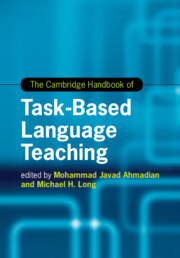Book contents
- The Cambridge Handbook of Task-Based Language Teaching
- Cambridge Handbooks In Language And Linguistics
- The Cambridge Handbook of Task-Based Language Teaching
- Copyright page
- Dedication
- Contents
- Figures
- Tables
- Contributors
- Preface The Origins and Growth of Task-Based Language Teaching
- Part I The Rationale for Task-Based Language Teaching
- Part II Tasks and Needs Analysis
- 3 Why Task? Task as a Unit of Analysis for Language Education
- 4 Adapting and Advancing Task-Based Needs Analysis Methodology across Diverse Language Learning Contexts
- 4A Developing a Task-Based Approach
- 4B A Task-Based Language Needs Analysis of Syrian Refugee Parents in Turkey
- 4C Task-Based Language Teaching in a Japanese University
- 4D The Implementation of a Task-Based Spanish-Language Program in Qingdao, China
- 5 The L in TBLT
- 5A Blustery with an Occasional Downpour
- 5B “I Have a Question”
- Part III The Task Syllabus and Materials
- Part IV Methodology and Pedagogy
- Part V Task-Based Language Teaching with School-Age Children
- Part VI The Teacher in Task-Based Language Teaching
- Part VII Task-Based Assessment and Program Evaluation
- Part VIII Research Needs and Future Prospects
- Index
- References
4B - A Task-Based Language Needs Analysis of Syrian Refugee Parents in Turkey
from Part II - Tasks and Needs Analysis
Published online by Cambridge University Press: 19 November 2021
- The Cambridge Handbook of Task-Based Language Teaching
- Cambridge Handbooks In Language And Linguistics
- The Cambridge Handbook of Task-Based Language Teaching
- Copyright page
- Dedication
- Contents
- Figures
- Tables
- Contributors
- Preface The Origins and Growth of Task-Based Language Teaching
- Part I The Rationale for Task-Based Language Teaching
- Part II Tasks and Needs Analysis
- 3 Why Task? Task as a Unit of Analysis for Language Education
- 4 Adapting and Advancing Task-Based Needs Analysis Methodology across Diverse Language Learning Contexts
- 4A Developing a Task-Based Approach
- 4B A Task-Based Language Needs Analysis of Syrian Refugee Parents in Turkey
- 4C Task-Based Language Teaching in a Japanese University
- 4D The Implementation of a Task-Based Spanish-Language Program in Qingdao, China
- 5 The L in TBLT
- 5A Blustery with an Occasional Downpour
- 5B “I Have a Question”
- Part III The Task Syllabus and Materials
- Part IV Methodology and Pedagogy
- Part V Task-Based Language Teaching with School-Age Children
- Part VI The Teacher in Task-Based Language Teaching
- Part VII Task-Based Assessment and Program Evaluation
- Part VIII Research Needs and Future Prospects
- Index
- References
Summary
To address the Turkish language needs of Syrian refugees, this study identifies target tasks critical for refugee parents in K–12 Turkish schools. It employed a triangulation of data from insider sources (parents, teachers, administrators) through non-participant observation, interviews and a questionnaire. Findings revealed that technology-mediated tasks were ranked most frequent across all school levels. Communicating and collaborating with other parents about school-related tasks was perceived to be most difficult. Based on these findings, we propose a sequence of target tasks and task types that can inform the curriculum of a task-based Turkish language course for refugee parents.
Keywords
Information
- Type
- Chapter
- Information
- The Cambridge Handbook of Task-Based Language Teaching , pp. 109 - 120Publisher: Cambridge University PressPrint publication year: 2021
